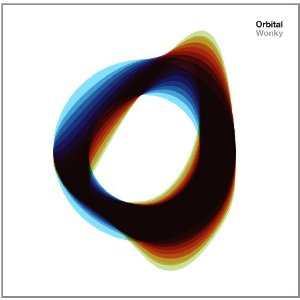In 1996 Orbital blew my tiny little indie-kid mind right out of the back of my head. I’d been tentatively making steps away from the boys-with-guitars hegemony of my friends’ music taste for months, when pre-release press and encouragement from an older sibling led me to buy a copy of In Sides from the local Woolworths on release day. I can remember distinctly my first listen to it; pressing play, vaguely intending to do something else, but having all my attention rapt within seconds, and held for the next 70 minutes. 16 years later, if I were forced to pick my ten favourite albums at gunpoint, In Sides would be one of them.
I quickly gathered up their previous albums, and fell deeply in love with Orbital’s entire oeuvre. Even though I wasn’t the kind of person who’d ever go to a rave in a field, or even a specialist techno night at a club particularly, the Hartnoll brothers were a gateway drug into a whole world of sounds that affected me greatly and which I’d scarcely imaged could exist beforehand.
Fast-forward to 2001 and The Altogether made Orbital sound confused and anachronistic. By the time Blue Album rolled around in 2004 I was happy for it to be their last; I enjoyed it, in the way one enjoys meeting up with a very old and distant friend and having the same conversations you used to have years before, only less enthusiastically. Dance music had become an increasingly urban concern, and Orbital’s field-and-sky friendly cinematic vistas didn’t scan. No one is ever quite as uncool and out of touch as they are ten years after their pomp.
But pop moves in cycles, or so we’re led to believe, and in a post-dubstep world where indie kids have sold their guitars (again) and bought synthesizers (again) so they can make electro records, it seems like Orbital make sense once more. It’s into this world, after three years of trepidatious but rapturously-received live comebacks and a couple of pleasantly forgettable new standalone tracks (we don’t really call them singles anymore), that they unleash Wonky, their eighth proper studio album. And it’s really good.
Not perception-realigningly good – I doubt many 16-year-olds will hear this and be forever changed – but hits-all-the-right-buttons good. Surprisingly so. Opener ‘One Big Moment’ starts with layers of quiet, sampled voices, a little like ‘Forever’ from Snivilisation, before dropping a beat and a reverberating synth riff and a slowly developing melodic topline that will have a Pavlovian effect on tens of thousands of people of a certain age. You could interpret that cynically, or you could put your hands in the air.
Wonky is Orbital’s most pop album; it’s supremely, relentlessly, even ruthlessly melodic, and laden with irresistible momentum throughout. It grooves more determinedly than either The Altogether or Blue Album managed, and hangs together as an album better, too – tracks run into each other a little, offer respite and reflection at just the right moments (‘Never’), and well-judged enthusiasm and vigour, too (the remarkable 1993-flashback strings and acid of, ahem, ‘Stringy Acid’). Nothing arrives at the wrong time or outstays its welcome.
This incredibly taut edge may well come partly from mixer Flood, who’s applied a dirty, electronic polish to everyone from U2 to Nick Cave to Nine Inch Nails to PJ Harvey over the years. The Zola Jesus-starring single ‘New France’, for instance, is overwhelmingly focused, a behemoth of a tune which manages to both sound incredibly ‘now’ (I can imagine it soundtracking a hedonistic party in whatever replaces Skins) and fit neatly into Orbital’s established catalogue.
This combination of familiarity and newness is consistent, and makes Wonky something far more than just an exercise in nostalgia, which is what Blue Album felt like even from the off. 16 years ago album closer ‘Where Is It Going?’ would have had its end-of-the-night melody strung out for 15 minutes, and it would have seemed perfect; now it lasts less than six, and leaves you wanting to press play again, which is no bad thing at all. And it probably will double in length when played live.
So ‘Beelzedub’, the much talked about nod towards dubstep, is actually less trend-chasing than you might imagine, and serves more as a gentle reminder that Orbital were doing wubbingly frenetic techno years ago – it reminds less of Burial or Skrillex than it does the Hartnoll’s own history, specifically ‘Satan’, which it’s directly descended from, and ‘Out There Somewhere (Part 1)’.
Likewise the title track, which features vocals from Lady Leshurr, isn’t an embarrassing attempt to graft some urban character onto blue skies techno; rather, improbably but with a sense of undeniable logic, it works by allowing Lady Leshurr and Orbital to do the same thing; exhort the crowd, bring them up, get their hands in the air. It’s what MCs are there for, and it’s what Orbital have been doing since they began; it’s also fantastic and unexpected.
There’s nothing on Wonky that’s quite as beautiful or abstract as Orbital’s very best moments from that amazing three-album run that takes in the brown album, Snivilisation and In Sides, but there’s plenty here to stand proudly alongside that material – the way ‘Straight Sun’ switches textures and beats back and forth, or how ‘Distractions’ builds and releases tension and emotion. Current gigs are made up of about 50% old material and 50% Wonky, and they’re being rapturously received. I don’t know if I’ll remember my first listen to it when I’m in my 40s, but right now I’m listening to it a lot. Orbital, the most emotionally and aesthetically maximalist of electronic musicians, are back, and I’m delighted.


